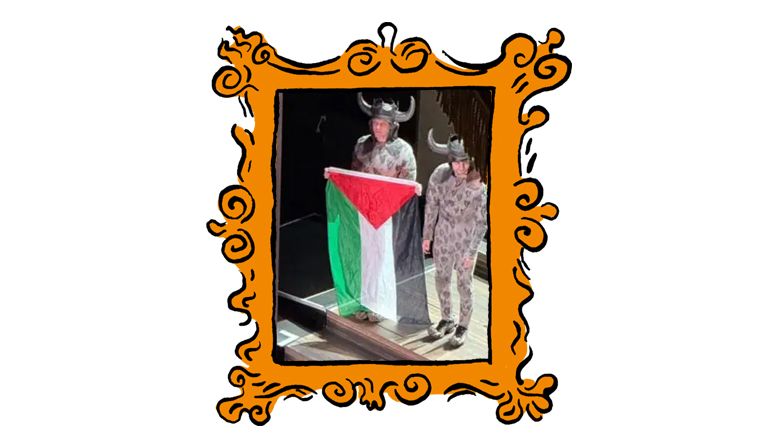During the final curtain call for a performance of Giuseppe Verdi’s Il trovatore at the Royal Ballet and Opera the other week, dancer Danni Perry raised a Palestinian flag. What ensued was a graceless tussle between Perry and director of opera Oliver Mears, who (unsuccessfully) tried to snatch the flag away.
The RBO condemned Perry’s actions and reportedly blacklisted them from future employment, citing the protest as a “wholly inappropriate act” that violated the organisation’s “commitment to political impartiality”.
Beyond the scuffle being slightly painful to watch (the first lesson to be learnt here is that if music staff want to save face, they should avoid physical altercations with professional dancers), the RBO’s statement feels erroneous—the idea of opera as a politically impartial space does not stand up to scrutiny. Opera has never been neutral. It is inextricable from its political context and has always been a tool for resistance and a space for complex social and political commentary.
The RBO’s “commitment to political impartiality” is quickly undermined by its own recent history. Over the last three years, the company has been outspoken in its support for Ukraine. They released a statement in 2022 announcing that “As an expression of respect for all those affected by this terrible conflict, we will be lighting our building in the colours of the Ukrainian flag every night from 28 February, and in a moment of reflection playing the national anthem of Ukraine before each performance.” That same summer, they cancelled a visit by Russia’s Bolshoi Ballet.
They also went on to launch a “Songs for Ukraine” chorus for Ukrainians in London, with the group even visiting No.10 last year. I’ve heard the PM is big into political impartiality.
But the RBO’s statement doesn’t just conveniently forget the past few years of its own—welcome—activism, it diminishes the history of opera as a political vessel. The medium has always been intertwined with politics.
Consider the work of Verdi himself: his operas became rallying cries for 19th century Italian nationalists, and Nabucco’s famous chorus, “Va, pensiero”, became a symbol of the struggle for Italian independence. Verdi even served in the country’s first ever parliament for four years. Would the RBO remove “Va, pensiero” to preserve its “political impartiality”? Highly unlikely.
Mozart’s operas, too, were full of rebellion. The Marriage of Figaro, written in the years leading up to the French Revolution, satirises class tensions and defies aristocratic authority, all while masquerading as a comedy. It was even banned in Vienna for its subversiveness. The Magic Flute—although presented as a fairy tale—is infused with the ideals of Freemasonry and is rich in Masonic symbolism, with both Mozart and librettist Emanuel Schikaneder belonging to the movement.
This is not just a matter of history; political engagement is vital for the preservation of the art form itself. Take Bizet’s Carmen, for example. At its core, it is a misogynistic opera that exoticises Roma women and glorifies the idea of femicide. The character of Carmen, often seen as a symbol of passionate promiscuity, is ultimately punished for her autonomy and sexual freedom. If we continue to perform Carmen without addressing its troubling themes, we risk perpetuating outdated and dangerous narratives.
This is where thoughtful, politically engaged productions come in. Cecilia Stinton’s 2022 production at Opera Holland Park reframed Carmen as an exploration of male violence against women and the dangers women face when rejecting men’s sexual advances. By acknowledging and confronting the problematic elements within the opera, Stinton allowed audiences to engage with the piece critically, rather than passively accepting its harmful messages. It also let you hum the “Habanera” slightly more guilt-free.
In the UK, opera houses still primarily perform more traditional works. These were mostly written by white men pre-1900 and are largely filled with misogynistic and racist tropes and themes (think of Puccini’s portrayal of Japanese women in Madama Butterfly). If directors remain “impartial” and these issues aren’t addressed on stage, then all audiences are left with are unchallenged depictions of men singing jolly tunes while murdering the women around them. Although this might suit one kind of audience, it’s also a one-way ticket to cultural irrelevance now and in future. If opera wants to survive, then it cannot be neutral.
Newer opera grapples with its political roots. Blue, by Jeanine Tesori, is an opera about police violence in the US and the murder of a young black man at a peaceful protest, while Jonathan Dove’s Itch tackles the climate crisis. This embracing of opera as a tool to reflect the political climate is, in fact, incredibly traditional; like the composers who came before them, Tesori and Dove use their art to address the issues of their time.
If stages can be home to discussions of racism and climate, why then—when there is a humanitarian crisis going on in Gaza—can a curtain call not be an occasion to raise a flag of solidarity?
Perry is a freelance dancer and never claimed to be representing the company. They said in an interview last week, “I chose to do my demonstration during my curtain call… I acted alone.” Rather, they were using the space the company gave them to make their statement. If Mears had chosen not to rush on stage and the RBO hadn’t condemned the act so strongly and quickly, the moment could simply have been part of opera’s history as a political space—rather than an awkward display of intolerance.
Across the Atlantic, US House Republicans have just passed an amendment that could rename the Kennedy Center’s opera house after Melania Trump. This comes months after President Donald Trump took over the performing arts centre and banned any performances linked to diversity programmes.
We should heed this warning. As rights for political expression are being ripped away from our American friends, it is important that we (and the Royal Ballet and Opera) remember what a privilege it is to be able to protest—and to use our creative stages to do so.
The RBO’s swift invocation of “political impartiality” isn’t only hypocritical; it reveals a misunderstanding of the art form they claim to steward. Opera has always been political and to deny that is to strip the art of its power—and its future.
Opera is a political space
A dancer recently held up a Palestinian flag after the performance of Verdi’s ‘Il trovatore’. That’s entirely in keeping with the art form’s history
July 31, 2025

© Magdalini Liousa








